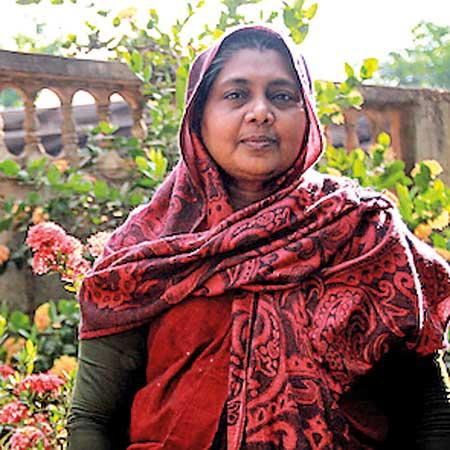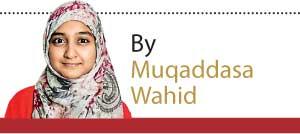23 Oct 2020 - {{hitsCtrl.values.hits}}
Winner of the 2020 Front Line Defenders Asia- Pacific Regional Award speaks to Daily Mirror
Juwairiya Mohideen is a name familiar among displaced people in the North and East. Having been evicted from  her hometown in 1990, Juwairiya has worked towards uplifting the lives of the displaced, especially those of women and children. Through her organisation, Muslim Women’s Development Trust (MWDT), Juwairiya has led women to parliament to lobby for reforms to the Muslim Marriage and Divorce Act (MMDA). Recently, Puttalam-based Juwairiya won the 2020 Front Line Defenders Asia-Pacific Regional Award.
her hometown in 1990, Juwairiya has worked towards uplifting the lives of the displaced, especially those of women and children. Through her organisation, Muslim Women’s Development Trust (MWDT), Juwairiya has led women to parliament to lobby for reforms to the Muslim Marriage and Divorce Act (MMDA). Recently, Puttalam-based Juwairiya won the 2020 Front Line Defenders Asia-Pacific Regional Award.
"Due to the recent island-wide curfew, many people in Mundel, Puttalam had no relief provided to them. Therefore, we, at MWDT decided to help them out. Through our Facebook page we uploaded a video which highlighted the plight of the people in this area and donations started pouring in. With donations from our well-wishers we were able to help approximately 2000 people in the area"
Q In 1990, your family was forced to resettle as refugees in Puttalam after being evicted by the LTTE in the North, how did this affect your life?
I was 23 when my parents, my grandmother and my eight siblings left our hometown of Erikulapity, Mannar and came to Kalpitiya by sea. We were only given two days to evict our hometown. We left our belongings behind because we thought we could go back in one month. However up to now we haven’t been able to return back. We struggled a lot living in the IDP camps as none of us had government jobs. My siblings were still studying. My older siblings and I were to apply for jobs. However it was then that we were forced to evict our hometown.
We faced a lot of hardships, living as Internally Displaced Persons (IDPs). I was in a camp in Fareedabad. The women in the camp would bathe between 1-2am because there wouldn’t be water in the morning. We could only bathe once a week because of this water issue. It was a difficult time for me, but it is an experience I would never forget. This experience has somehow shaped me to become who I am today, to be able to withstand everything.
"I felt a need to do more for women’s rights and to ensure every woman had access to their basic rights. Thus, I formed the MWDT with around 75 women in 2010. MWDT was started with one pen, one paper and one table. Initially, even to obtain printouts, we would have to travel about 5kms"
 Q How did your start your journey as a human rights activist and what inspired you to do so?
Q How did your start your journey as a human rights activist and what inspired you to do so?
We did no wrong, yet we suffered a lot. I felt that this was an injustice meted out to us. We didn’t have access to basic human rights. Due to not having these basic rights, it ignited a need in me to speak up for human rights. I started my journey volunteering at the Rural Development Foundation (RDF), providing support to the community of IDPs. I also volunteered at certain women’s associations. Through my volunteering, many people around the area got to know me. People who visited the IDP settlements would always meet me and talk to me. Since people knew I was a volunteer, I was made aware of certain meetings and workshops regarding human rights, and I was able to attend them. I also travelled to Colombo for a few of them, and was able to work at the national level regarding human rights.
Q What is the story behind setting up the Muslim Women’s Development Trust (MWDT)?
When I was around 24 or 25 years old, I attended meetings conducted by the Muslim Women’s Research and Action Forum (MWRAF) and was made aware about the Muslim Marriage and Divorce Act (MMDA). At the women’s associations I volunteered at I met women who were affected by the unequal provisions in the MMDA. As a volunteer, I’ve also been to Quazi courts and seen how the proceedings take place. This made me want to work towards women’s rights and bettering life for women, especially rural and displaced women. My experience as a volunteer helped me lead delegations of women to the parliament to lobby for MMDA reforms, and we also lobbied at grassroots levels at village mosques.
I felt a need to do more for women’s rights and to ensure every woman had access to their basic rights. Thus, I formed the MWDT with around 75 women in 2010. MWDT was started with one pen, one paper and one table. Initially, even to obtain printouts, we would have to travel about 5kms. I am grateful to our well-wishers who have helped to develop the organization. We started the MWDT to help women in the village. But today we are able to have a national impact, which we never imagined.
"Once I spoke to the media regarding the discrimination faced by Muslim women because of certain provisions in the MMDA, and people insulted me, threatened me and said I was speaking against the religion. I was shunned by the community and called a traitor"
Q What do you do in MWDT?
MWDT leads discussions regarding the MMDA at the grassroots level and is also working towards the reforms at national level along with other organisations from the North and East. We provide survivors of domestic abuse and rape access to proper legal aid. We also provide counselling services for them. Sometimes the Puttalam Magistrate Court sends people to us for counselling as we provide counselling in Tamil. Currently we are conducting a peace building and reconciliation programme among the youth in the North and East.
The MWDT also carries out awareness programmes regarding underaged marriage in women’s organizations in the area. We also provide access to legal aid to child brides. In addition to this, in one village we have formed a Children’s Club with the vision of promoting the importance of education and minimizing underaged marriages. Presently, we are doing a research on underaged marriages.
"I attended meetings conducted by the Muslim Women’s Research and Action Forum (MWRAF) and was made aware about the Muslim Marriage and Divorce Act (MMDA). At the women’s associations I volunteered at I met women who were affected by the unequal provisions in the MMDA. As a volunteer, I’ve also been to Quazi courts and seen how the proceedings take place"
Q You have been on the frontline regarding discrimination faced against Muslim women including discriminatory family laws.How has this affected your personal life?
Winning this award was a very special moment for me. However on social media I came across many hateful comments that were directed at me. Certain people in the Muslim community state that I work against the teachings of Islam. Once I spoke to the media regarding the discrimination faced by Muslim women because of certain provisions in the MMDA, and people insulted me, threatened me and said I was speaking against the religion. I was shunned by the community and called a traitor. Everywhere I went people insulted me. Because of this, I did not step out of my house for about three months, except to go to office and back home. My family, except for my husband, told me to give up the work, and said they were feeling ashamed by me. My husband was also humiliated. I was very affected by this.
However, I consulted a few religious scholars and they told me I wasn’t going against the religion. This understanding, coupled with the knowledge that those who were shunning me didn’t know anything about the MMDA helped me keep my head high.
"We were only given two days to evict our hometown. We left our belongings behind because we thought we could go back in one month. However up to now we haven’t been able to return back"
Q What are your future plans?
Due to the recent island-wide curfew, many people in Mundel, Puttalam had no relief provided to them. Therefore, we, at MWDT decided to help them out. Through our Facebook page we uploaded a video which highlighted the plight of the people in this area and donations started pouring in. With donations from our well-wishers we were able to help approximately 2000 people in the area. While giving them relief packages, I got to know that the neighbouring villages which included Sinhala and Muslim people on each side, had animosity between them ever since the Easter Sunday bombings. Because we were a Muslim organisation providing relief to both the villages, the villagers were able to bridge the animosity between them. Such incidents have made me further my campaign of training youth activists towards peace and reconciliation.
Also, I feel like the MWDT hasn’t worked much with the other communities as it has with the Muslim community. So we are looking forward to working more with the other communities in the future. We are also working towards the resettlement of IDPs. As for me, I will continue working until every women gets access to basic human rights and gender-discriminatory laws are reformed.
09 Jan 2025 5 hours ago
09 Jan 2025 6 hours ago
09 Jan 2025 9 hours ago
09 Jan 2025 9 hours ago
09 Jan 2025 09 Jan 2025